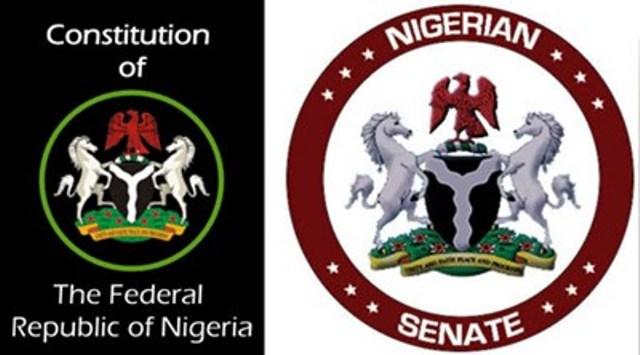President, governors, others stripped of criminal immunity
A bill seeking to peg minimum educational qualification for persons seeking to occupy the office of President of Nigeria and state governors scaled second reading at the senate yesterday.
Also, the bill seeks to make the Ordinary National Diploma (OND) the minimum qualification for the national and state assembly legislators.
The bill, sponsored by Mr. Istifanus Huang, (PDP, Plateau State) seeks to provide for the amendment of Sections 65 (2) (a), 131 (d), Section 106 (c) and Section 177 (d) of the 1999 Constitution (as amended) on the minimum educational qualification for those seeking such elective positions.
The bill entitled ‘The Constitution of The Federal Republic of Nigeria 1999 (in this Bill referred to as “the Principal Act”) is altered as set out in the Bill’ reads in part: “The bill is seeking the alteration of section 65 (2) (a) of the Constitution which deals with the qualifications for intending members of the National Assembly.”
The extant law which the bill seeks to amend reads: “A person shall be qualified for election under subsection (1) of this section if he has been educated up to at least School Certificate level or its equivalent. Section 65 (2) (a) is now rephrased to read “if he has been educated to at least National Diploma level or its equivalent.”
The bill also seeks to alter Section 131(d) which states that a presidential candidate and the deputy must have “been educated up to at least School Certificate level or its equivalent.”
The amendment is now rephrased to read: “He has been educated up to at least HND level or’ its equivalent.”
For house of assembly, the bill seeks the alteration of section 106 (c) of the Constitution.
According to the existing law, anyone aspiring to be a member of the house of assembly must have “been educated up to at least the School Certificate level or its equivalent.”
It is, however, now rephrased to read: “If he has been educated up to National Diploma level or its equivalent.”
For governorship candidates, the bill seeks the alteration of section 177 (d) of the Constitution which currently states that the person must have “been educated up to at least School Certificate level or its equivalent.”
It is now rephrased to read: “If he has been educated up to at least Higher National Diploma Level or its equivalent.”
Also yesterday, a bill seeking alter the constitution and strip the president, his deputy, governors and their deputies of immunity from criminal prosecution was read for the first time at the senate plenary.
Sponsored by the deputy senate president, Mr. Ovie Omo-Agege, the legislation states that immunity will not apply “to persons who hold the office of vice president, governor or deputy governor, if it is determined either by the Economic Financial Crimes Commission, Independent Corrupt Practices Commission, Nigerian Police and State Security Service through a collaborative investigation that the said person is indicted by a court of competent jurisdiction for financial misappropriation of funds belonging to the federal, state or local government; or sponsoring of thugs to perpetrate violence that causes injury or death of political opponent, a member of his family, agent or personal representative.”
Currently, Section 308 of the 1999 Constitution (as amended) states: “Notwithstanding anything to the contrary in this constitution, but subject to subsection (2) of this section, no civil or criminal proceedings shall be instituted or continued against a person to whom this section applies during his period of office.
“A person to whom this section applies shall not be arrested or imprisoned during that period either in pursuance of the process of any court or otherwise; and no process of any court requiring or compelling the appearance of a person to whom this section applies, shall be applied for or issued.
“Provided that in ascertaining whether any period of limitation has expired for the purposes of any proceedings against a person to whom this section applies, no account shall be taken of his period of office.
“The provisions of subsection (1) of this section shall not apply to civil proceedings against a person to whom this section applies in his official capacity or to civil or criminal proceedings in which such a person is only a nominal party. This section applies to a person holding the office of president or vice president, governor or deputy governor; and the reference in this section to ‘period of office’ is a reference to the period during which the person holding such office is required to perform the functions of the office.”
With NAN report





















































